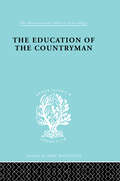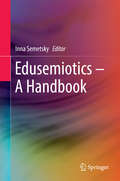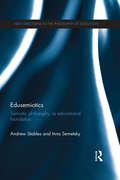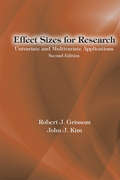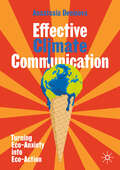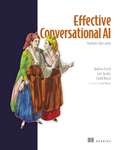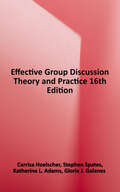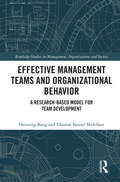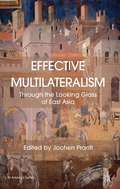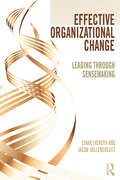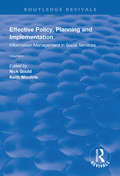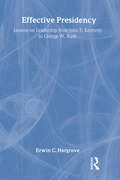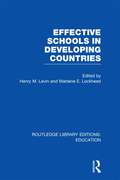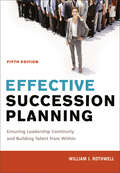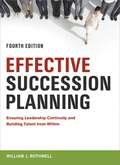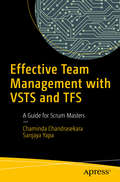- Table View
- List View
Eductn Of Countryman Ils 224 (International Library of Sociology)
by Harry McGuire BurtonFirst Published in 1998. Routledge is an imprint of Taylor & Francis, an informa company.
Edusemiotics – A Handbook
by Inna SemetskyEdusemiotics is a pioneering area of study that connects semiotics - the science of signs - with educational theory and the philosophy of education. This volume reflects cutting-edge research by scholars in education and in semiotics worldwide, bridging the two discourses to present the state of the art in this new transdisciplinary field. The book's emphasis is on educational theory as based on semiotic philosophy: as such, it challenges the current conception of semiotics in education as merely a sub-branch of applied semiotics. It presents edusemiotics as a novel unified conceptual framework at the interface of theoretical semiotics and educational philosophy, based on both theoretical and empirical studies from around the world. The chapters in this handbook also bring to the fore the intellectual legacy of Charles S. Peirce, John Dewey, Gilles Deleuze, Umberto Eco, Julia Kristeva, Mikhail Bakhtin, Paul Ricoeur, Martin Heidegger and other thinkers, pointing out the implications of edusemiotics for meaningful pedagogy and experiential learning in diverse contexts.
Edusemiotics: Semiotic philosophy as educational foundation (New Directions in the Philosophy of Education #64)
by Inna Semetsky Andrew StablesEdusemiotics addresses an emerging field of inquiry, educational semiotics, as a philosophy of and for education. Using "sign" as a unit of analysis, educational semiotics amalgamates philosophy, educational theory and semiotics. Edusemiotics draws on the intellectual legacy of such philosophers as John Dewey, Charles Sanders Peirce, Gilles Deleuze and others across Anglo-American and continental traditions. This volume investigates the specifics of semiotic knowledge structures and processes, exploring current dilemmas and debates regarding self-identity, learning, transformative and lifelong education, leadership and policy-making, and interrogating an important premise that still haunts contemporary educational philosophy: Cartesian dualism. In defiance of substance dualism and the fragmentation of knowledge that still inform education, the book offers a unifying paradigm for education as edusemiotics and emphasises ethical education in compliance with the semiotic unity between knowledge and action. Chapters contain accessible discussions in the context of educational philosophy and theory, crossing the borders between logic, art, and science together with a provocative theoretical critique. Recently awarded a PESA book award for its contribution to the philosophy of education, Edusemiotics will appeal to an academic readership in education, philosophy and cultural studies, while also being an inspiring resource for students.
Edward Conze's The Psychology of Mass Propaganda
by Richard N. Levine Nathan H. LevineEdward Conze’s The Psychology of Mass Propaganda presents a commentary on the psychology of propaganda during the rise of fascism in Europe in the 1930s. It discusses the conditions which generate vulnerability to misinformation in human societies, and thus offers insight into how propaganda may be "withstood." Completed in 1939, during the period of Conze’s own inflection from Marxist philosophy to Buddhist studies, the original manuscript was never published and is now in print for the first time. Presenting a unique historical perspective, while also appealing to an acutely topical interest in the conditions under which autocracy and fascism arise, the book examines the psychology of mass propaganda through copious contemporary and historical examples. Conze focuses especially on recent news articles and the statements of the propagandists of many of the governments that would go on to participate in the Second World War, including Germany, Italy, the USSR, USA and UK, all of which he interprets through the lens of recent psychological and historical research. The book has been edited and includes a new introduction by Richard N. Levine and Nathan H. Levine, also featuring a foreword by American legal scholar Laurence H. Tribe, and an afterword by actor, director, writer, and Buddhist priest Peter Coyote. This is a fascinating opportunity for scholars across several disciplines, including political scientists and psychologists, historians and sociologists, to access one of Conze’s previously unpublished works. It will also be of importance to those interested in Conze’s work on Buddhist philosophy, and in the psychology of propaganda more broadly.
Edward Said and the Literary, Social, and Political World (Routledge Studies in Social and Political Thought)
by Ranjan GhoshEdward Said is widely recognized for his work as a critic and theorist of Orientalism and the Palestine crisis, but far less attention has been devoted to his considerable body of literary and cultural criticism. In this edited collection, the contributors - many among the foremost Said scholars in the world - examine Said as the literary critic; his relationship to other major contemporary thinkers (including Derrida, Ricoeur, Barthes and Bloom); and his involvement with major movements and concerns of his time (such as music, Feminism, New Humanism, and Marxism). Featuring freshly carved out essays on new areas of intervention, the volume is an indispensable addition for those interested in Edward Said and the many areas in which his legacy looms.
Edwardian England and the Idea of Racial Decline: An Empire’s Future
by Christopher PriorEmerging from a long and exhausting conflict against the Boers in South Africa, Edwardians are often perceived as rocked by a profound set of doubts about the future of the British Empire. Drawing upon a wide range of popular sources, this study considers the level of middle-class engagement with such strains of pessimistic thought.
Eerste hulp bij praktijkgericht onderzoek: Een handleiding voor hbo-studenten in de gezondheidszorg
by Jaap Brunnekreef Joost SeegerDit boek is hét handboek voor elke hbo-student die praktijkgericht onderzoek doet binnen de gezondheidszorg en extra hulp kan gebruiken. Stapsgewijs word je meegenomen door het onderzoeksproces. Aan de hand van het boek blijf je op koers en werk je aan betekenisvol onderzoek, met daadwerkelijke impact op de beroepspraktijk. Eerste hulp bij praktijkgericht onderzoek is opgebouwd aan de hand van de vijf fases van de onderzoekscyclus. Achtereenvolgens worden de probleemanalyse, het onderzoeksdesign, de dataverzameling, de data-analyse en het rapporteren behandeld. Wie het boek leest tijdens het doen van zijn onderzoek, weet daardoor altijd op tijd wat de volgende stap moet zijn. Alle belangrijke thema’s komen aan bod, van wetgeving tot het schrijven van een goed artikel en het kiezen van het juiste onderzoeksdesign. Het boek is no-nonsense, biedt gerichte handvatten om direct toe te passen, is makkelijk leesbaar en aangevuld met online kennisclips. Kortom dit boek is een musthave voor elke HBO-student die wel wat extra hulp kan gebruiken bij het uitvoeren van het praktijkgerichte onderzoek. De auteurs zijn beiden als docent verbonden aan de Hogeschool van Arnhem en Nijmegen en werkzaam voor de Academie Paramedische studies. .
Effect Sizes for Research: Univariate and Multivariate Applications, Second Edition
by Robert J. Grissom John J. KimNoted for its comprehensive coverage, this greatly expanded new edition now covers the use of univariate and multivariate effect sizes. Many measures and estimators are reviewed along with their application, interpretation, and limitations. Noted for its practical approach, the book features numerous examples using real data for a variety of variables and designs, to help readers apply the material to their own data. Tips on the use of SPSS, SAS, R, and S-Plus are provided. The book's broad disciplinary appeal results from its inclusion of a variety of examples from psychology, medicine, education, and other social sciences. Special attention is paid to confidence intervals, the statistical assumptions of the methods, and robust estimators of effect sizes. The extensive reference section is appreciated by all. With more than 40% new material, highlights of the new editon include: three new multivariate chapters covering effect sizes for analysis of covariance, multiple regression/correlation, and multivariate analysis of variance more learning tools in each chapter including introductions, summaries, "Tips and Pitfalls" and more conceptual and computational questions more coverage of univariate effect sizes, confidence intervals, and effect sizes for repeated measures to reflect their increased use in research more software references for calculating effect sizes and their confidence intervals including SPSS, SAS, R, and S-Plus the data used in the book are now provided on the web along with new data and suggested calculations with IBM SPSS syntax for computational practice. Effect Sizes for Research covers standardized and unstandardized differences between means, correlational measures, strength of association, and parametric and nonparametric measures for between- and within-groups data. Intended as a resource for professionals, researchers, and advanced students in a variety of fields, this book is also an excellent supplement for advanced statistics courses in psychology, education, the social sciences, business, and medicine. A prerequisite of introductory statistics through factorial analysis of variance and chi-square is recommended.
Effective Climate Communication: Turning Eco-Anxiety into Eco-Action
by Anastasia DenisovaThis book explores the urgent challenges of communicating climate change in the media. While many books have been written about climate change, this book goes to the very heart of what makes humans care about stories enough to act. In a direct and sympathetic approach, Denisova tackles problems of greenwashing, news narratives, colonial framings and more. Taking climate anxiety as a starting point, the author positions herself with empathy and asks the question: ‘what slows down citizen action?’ This fresh perspective acknowledges the pressing challenge of public disengagement and the anxiety people feel when faced with increasingly bleak headlines as the climate crisis intensifies. There is a surprising challenge to apocalyptic storytelling and a hero’s narrative, which Denisova argues are counter-productive, while solutions are provided for media storytellers. This book is essential reading for anyone seeking to ease climate-related anxiety and foster a deeper sense of empowerment in their audience.
Effective Conversational AI: Chatbots that work
by Andrew Freed Eniko Rozsa Cari JacobsCreate and improve conversational AI with the latest patterns, best practices, and tools, including generative AI models.Conversational AI (CAI) tools are built to solve problems, but all-too-often they just end up causing pain for users–and developers! Effective Conversational AI reveals best practices and industry-tested techniques for creating chatbots and conversational AI tools that are reliable at an enterprise scale. With the tested ideas and examples in this book, you&’ll learn to build chatbots that your customers and colleagues will actually want to use! In Effective Conversational AI you&’ll learn how to: • Create high-quality chatbots and other conversational AI experiences • Plan for continuous improvement • Incorporate generative AI solutions to improve quality, accuracy, and usability • Evaluate user experience and business results Effective Conversational AI introduces continuous improvement practices that are vital for the constant betterment and evolution of chatbots and CAI tools. It introduces the three most-common forms of chatbot—Q&A, process-oriented, and routing agents—and presents a reliable framework for continuously improving each one. Using modern generative AI and tried-and-tested classic approaches, you&’ll learn to deliver high performance chatbots that can guide a customer through complex end-to-end tasks—no human required! Foreword by Jesús Mantas. About the technology Powerful new chatbot frameworks and Generative AI models can practically eliminate problems like misinterpreting user intent and delivering nonsensical answers. In this book, you&’ll learn how to build chatbots that take advantage of large language models and other modern tools and create conversational AI experiences users will love. About the book Effective Conversational AI teaches you how to build great chatbots that perform reliably even at enterprise scale. In it, you&’ll learn how to clarify user intent using LLMs, respond accurately to unanticipated input, and use Retrieval Augmented Generation to keep responses up to date. Along the way, you&’ll discover how to establish a feedback loop for continuous quality improvement and master techniques to integrate GenAI safely into conventional chatbot designs. What's inside • Blend Generative AI and conventional chatbot tools • Use LLMs to improve quality, accuracy, and usability • Plan for continuous improvement • Domain-specific responses using RAG About the reader For developers, engineers, and product managers working with conversational AI. About the author Andrew Freed, Cari Jacobs, and Eniko Rózsa are seasoned conversational AI developers with IBM. Table of Contents Part 1 1 What makes conversational AI work? 2 Building a conversational AI 3 Planning for improvement Part 2 4 Understanding what your users really want 5 Improving weak understanding for traditional AI 6 Enhancing responses with retrieval-augmented generation 7 Augmenting intent data with generative AI Part 3 8 Streamlining complex flows 9 Harnessing context for an adaptive virtual assistant experience 10 Reducing complexity with generative AI Part 4 11 Reducing opt-outs 12 Conversational summarization for smooth handoff
Effective Directors: The Right Questions to Ask (QTA) (Questions to Ask (QTA))
by Charlotte ValeurThe ebook will be Open Access and made available on publication. Being a good board member is not about knowing everything; it is about asking the right questions and challenging appropriately. Effective Directors: The Right Questions To Ask (QTA) is a reference book for board members and executives globally to support them in their work. With chapters written by senior company board members and respected figures in corporate governance, the questions have been drawn together to offer food for thought and useful prompts that take boards beyond operational discussions. The book clearly presents key areas to be considered by the board (there are over 50 in total) and range from board composition, to data security, diversity and inclusion, and succession planning. The questions are ones that boards, in any organisation, should be asking themselves, their fellow board members, service providers, executives, and other stakeholders to ensure that the right issues are raised, transparency and effective oversight are achieved, and the board is fulfilling its role in governing the organisation. In addition to being invaluable for board members, the book is also a very useful tool for executives in understanding the kind of questions their board members are likely to ask, and the kind of questions that should be asked and discussed in the boardroom.
Effective Group Discussion: Theory and Practice
by Katherine L. Adams Carrisa Hoelscher Stephen Spates Gloria J. GalanesNow in its sixteenth edition, Effective Group Discussion combines the most recent research findings and practical tools students need to become productive group members. The text covers various secondary groups: work groups, committees, task forces, self-directed work teams, and other small groups whose objectives include finding solutions to problems, producing goods, and creating policies.
Effective Human Relations: Personal and Organizational Applications
by Barry L. Reece Rhonda BrandtThis comprehensive text covers the key human relation skills students need to be successful managers in the workplace. Ideal for both two- and four-year programs, Effective Human Relations uses an organizational perspective to help students understand the disparate factors that influence employee behavior. The Tenth Edition focuses more directly on chapter objectives, establishing them around the seven themes of the text--communication, self-awareness, self-acceptance, motivation, trust, self-disclosure, and conflict resolution--so that the students absorb and connect the concepts. New areas of coverage include goal-setting principles; root causes of negative attitudes; introduction of the Reiss Profile instrument used to classify our basic desires; the use of "branding" to achieve greater visibility in a crowded job market; discrimination based on a person's religious preference; new ways to classify various forms of technostress; and new support for the importance of emotional intelligence. Throughout the text, major themes are supported by a multitude of real-world examples and emotional intelligence checkpoints.
Effective Intercultural Evangelism: Good News in a Diverse World
by W. Jay Moon W. Bud SimonWe live in a multicultural society. But Christians often do not know how to engage those of other faiths. As a result, many Christians hesitate to talk about Christianity with others in any kind of evangelistic way. Jay Moon and Bud Simon unpack the intercultural dynamics that Christians need to understand when encountering people from different communities and cultural backgrounds. Regarding evangelism from the perspective of four major worldviews (guilt/justice, shame/honor, fear/power, and indifference/belonging with purpose), this book demonstrates contextual evangelism approaches that are relevant, biblical, and practical. The authors draw on new research conducted with hundreds of participants that reveal concrete ways to communicate the gospel effectively across cultures. Sharing one's faith does not require attacking other religions; rather, we can engage at the worldview level in order to address people's deepest concerns. Greater understanding provides us with better skills for relational connection, empathy, and effective witness.
Effective Management Teams and Organizational Behavior: A Research-Based Model for Team Development (Routledge Studies in Management, Organizations and Society)
by Henning Bang Thomas Nesset MidelfartMost contemporary organizations use management teams to manage and coordinate their businesses at all levels of the organizational hierarchy. Management teams typically set overall goals, strategies, and priorities, making vital organizational decisions. They discuss issues, solve problems, offer advice, and ensure various processes and units are aligned and interact efficiently. Although management teams are vital for overall organizational performance, research indicates that they are largely underused and less effective than their potential would suggest for value creation. This book provides a research-based and practical model of the characteristics of effective management teams. It looks in depth at each factor of the model, discusses the supporting research, provides examples of how the factors influence the work and effectiveness of management teams, and shares tips and tools for successfully working with management team development. It provides researchers, academics, and students of organizational behavior with an overview of the variables that empirical research has found to be robustly related to management team effectiveness and will enable leaders and management consultants to develop more effective management teams.
Effective Multicultural Teams: Theory and Practice
by Claire B. Halverson S. Aqeel TirmiziMulticultural and multinational teams have become an important strategic and structural element of organizational work in our globalized world today. These teams are demonstrating their importance from the factory floors to the boardrooms of contemporary organizations. The emergence of multicultural teams is evident across a variety of organizations in the private, public, and civil society sectors. These developments have led to an increasing interest in the theory and practice of multicultural teams. Management educational and training programs are giving increasing attention to these developments. At the same time, there is emerging interest in research about and study of multicultural teams. This book emerged from our teaching, research, and consulting with multicultural and diverse teams in multiple sectors over the last several years. In particular, we have developed and refined our ideas about the concepts in this book from teaching an advanced course called Effective Multicultural Teams in the Graduate Program at the School for International Training (SIT) in Vermont. We have learned from the rich background of students who are from, and have worked in, six contents, and who are, or plan to be, working in the public, educational, not-for-profit, and for-profit sectors. Additionally, we have engaged with a variety of teams through our consulting and training, providing consultation to teams in a variety of sectors and continents as they struggled to become more effective.
Effective Multilateralism
by Jochen PrantlExisting theories of cooperation assume a stable geo-political order, led by countries with a shared conception of the modalities of cooperation. These assumptions are no longer justified. Effective Multilateralism makes the case for a new approach to explaining international cooperation through the lens of East Asian.
Effective Organizational Change: Leading Through Sensemaking
by Einar Iveroth Jacob HallencreutzOrganizations are constantly evolving, and intelligent leadership is needed during times of transformation. Change leaders must help people become aware of, understand and find meaning in the new things which arise — they must oversee a sensemaking process. Addressing this need, Effective Organizational Change explores the importance of leadership for organizational change based on sensemaking. Combining a theoretical overview, models and conceptual discussions rich with in-depth examples and case studies, this book uncovers what it is that leaders actually do when they lead change through sensemaking. It presents the most current sensemaking research, extends earlier work by developing the concept of ‘landscaping’, and provides guidelines on how leaders can drive sensemaking processes in practice. This book is for undergraduate, postgraduate and MBA students of organizational change, as well as managers embarking on change projects within their organizations.
Effective Policy, Planning and Implementation: Volume 2: Information Management in Social Services (Routledge Revivals)
by Nick Gould Keith MoultrieFirst published in 1997, in this second volume Gould and Moultrie compile writings from various professionals in the public service sector, researchers and other academics in support of the Social Services Research and Development Unit (or SSRADU) at the University of Bath. Primarily focusing on three points of research: In retrospect, the lessons learnt form implementing information systems in to address specific needs of the social service organisation. Different processes that can successfully identify the major information needs of the late 1990s, encompassing efficient and relevant information to inform social service planning. Finally, the management of information in social services in a national and international context.
Effective Presidency: Lessons on Leadership from John F. Kennedy to George W. Bush
by Erwin C. HargroveEvery four years the American public goes to the polls in hopes of electing a hero to the presidency, trying to find someone larger than life. But heroes are hard to find and sometimes they turn out to be villains. Senior presidential scholar Erwin Hargrove recommends that we shift our sights to electing an effective president instead, and here he shows us how to assess effective presidencies. To address the central question of whether presidents make a difference, Hargrove asks about the most important things each president attempted. He finds that much of the time, "eventful" leadership prevails, but that some presidents may be judged to be "event-making" for good or ill. As George W. Bush has demonstrated, event making leaders run great risks-sometimes challenging the Constitution-even as they attempt greatness. By contrast, effective presidents combine eventful leadership with a modulated sense of personal ambition. Hargrove examines this winning combination in light of historical context and a fine gauge of personal skills and attributes. Reviewing eventful and event-making presidencies of the last fifty years, Hargrove comes down on the side of effectiveness over the special effects of pyrotechnic presidencies like the current one.
Effective Remote Work: For Yourself, Your Team, And Your Company
by Dr James StanierThe office isn't as essential as it used to be. Flexible working hours and distributed teams are replacing decades of on-site, open-plan office culture. Wherever you work from nowadays, your colleagues are likely to be somewhere else. No more whiteboards. No more water coolers. And certainly no Ping-Pong. So how can you organize yourself, ship software, communicate, and be impactful as part of a globally distributed workforce? We'll show you how. It's time to adopt a brand new mindset. Remote working is here to stay. Come and join us. Remote working is on the rise. Whether or not we are remote workers, it is likely we are all part of a global workforce. We need to learn to interact remotely, because we are all remote from someone in some way. Rather than simply simulating the way we'd usually work together via digital means, we have to learn new communication skills and adopt a different mindset in order to work remotely effectively, efficiently, and, most importantly, healthily.We'll start by getting you set up with the right equipment and habits. Then, we'll learn the mindset of treating everyone as remote, and conquer both synchronous and asynchronous communication. You'll learn how to produce amazing artifacts, how to communicate clearly, and how to manage yourself and your teams. Then we'll look at the bigger picture: from measuring the remote readiness of your workplace, to creating a handbook for your team, to exploring remote-first culture and tackling burnout and mental well-being.Fundamentally we'll see that adopting a remote-working mindset can do wonders for our organization, our effectiveness, and our impact in our careers. It can even create a more diverse and inclusive industry for us all to work in.So what are you waiting for? The remote future is now. Be a part of it.What You Need:There are no prerequisites to reading this book, other than having had some experience of working in the software industry and a healthy curiosity.
Effective Schools in Developing Countries (Routledge Library Editions: Education #Vol. 15)
by Henry M. LevinThis volume brings together eight case studies which describe a variety of initiatives to create more effective schools for children of poverty, especially in the Third World. The initiatives reviewed published and unpublished documents and both qualitative and statistical studies were examined. Countries include Brazil, Burundi, Colombia, Ghana, Nepal, Sri Lanka, Thailand and the United States. Each initiative was developed independently to address unique challenges and situations but taken as a group, the features of the approaches described in this volume can be viewed as a basis for considering the development of effective schools strategies in other contexts.
Effective Succession Planning: Ensuring Leadership Continuity and Building Talent from Within
by William J. RothwellOrganizations that don&’t take steps to address future talent needs at all levels will face some major obstacles when undervalued key employees get burned out and leave you to fend for yourself.Nobody likes to lose good employees. But sometimes the loss of a key employee can be disruptive to the business at best, and completely disastrous at worst. The most comprehensive book on the subject, the fifth edition of the bestselling Effective Succession Planning covers every base of how to address future talent needs before a crisis hits, including how to:Identify competencies and clarify organizational valuesPlan for and quickly fill crucial vacancies at all levelsDevelop and retain top talentAssess current needs and future resources for seamless succession planningUpdated with current best practices, trends, and technology, the latest edition also includes: succession planning for small businesses and nonprofits; replacement planning; transition management; downsizing; international issues; mergers and acquisitions as a talent strategy; and succession planning for technical positions as well as roles built on longstanding social relationships.Don&’t risk the loss of your most valued employees and their accumulated wisdom and experience that has been key to your company&’s success for many years. Effective Succession Planning is your go-to indispensable guide for avoiding the catastrophe that losing them would bring.
Effective Succession Planning: Ensuring Leadership Continuity and Building Talent from Within
by William RothwellWilliam Rothwell honored with the ASTD Distinguished Contribution Award in Workplace Learning and Performance. The definitive guide to a timely and timeless topic-- now fully revised and updated. As baby boomers continue to retire en masse from executive suites, managerial offices, and specialized or technical jobs, the question is—who will take their places? This loss of valuable institutional memory has made it apparent that no organization can afford to be without a strong succession program. <P><P>Now in its fourth edition, Effective Succession Planning provides the tools organizations need to establish, revitalize, or revise their own succession planning and management (SP&M) programs. The book has been fully updated to address challenges brought on by sea changes such as globalization, recession, technology, and the aftereffects of the terror attacks. It features new sections on identifying and assessing competencies and future needs; management vs. technical succession planning; and ethics and conduct; and new chapters on integrating recruitment and retention strategies with succession planning programs. This edition incorporates the results of two extensive new surveys, and includes a Quick Start guide to help begin immediate implementation as well as a CD-ROM packed with assessments, checklists, customizable guides, and other practical tools.
Effective Team Management with VSTS and TFS: A Guide For Scrum Masters
by Chaminda Chandrasekara Sanjaya YapaGain the essential knowledge to use VSTS/TFS effectively to empower your Agile teams. This book provides a deep analysis into issues Agile teams may face and how to overcome them by adopting and implementing the proper tools.Rather than just review VSTS/TFS features, this book provides proven solutions to the challenges in building better Agile teams. You'll see how to handle small teams and how to facilitate large teams to support large scale projects. You'll also learn to work with distributed teams in different geo locations, which will deepen your ability to get successful project/product outcomes from your teams. Special focus is given to creating long term sustainability to effectively manage a backlog/portfolio backlog. You'll explore how to work with stakeholders closely to better understand a project's requirements and review how to perform the post execution analysis and planning for next development cycle and forecasting.What You'll LearnHandle large teams and distributed teams with VSTS/TFS.Run Agile team functionsReview requirements to delivery traceability, with visibility and accountabilityOvercome challenges and avoid common pitfalls with Agile teamsWho This Book Is ForScrum masters, project managers, team leads, Agile team members or anyone who handles and involves in the enterprise software delivery process.
